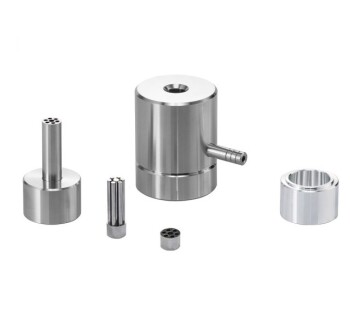At their core, hydraulic presses derive their versatility from the precise and adaptable control of force, while their efficiency comes from the fundamental principle of fluid mechanics. This combination allows them to apply anything from immense, part-forming pressure to a delicate, consistent touch, all from a single, reliable machine.
The true advantage of a hydraulic press is not merely its capacity for brute force, but its ability to deliver that force with surgical precision. This makes it uniquely adaptable to a vast spectrum of tasks, from heavy industrial manufacturing to sensitive laboratory research.

The Principle: Precise Force Multiplication
The entire function of a hydraulic press is built on its ability to control pressurized fluid. This simple concept is the source of its most powerful characteristics.
Unmatched Force Control
A hydraulic press generates force by moving fluid into a cylinder, which acts on a piston. By simply adjusting the fluid pressure, you gain direct, granular control over the output force. This is why the same press can be used for both heavy-duty forming and delicate assembly.
Consistent and Even Pressure
Unlike mechanical presses that deliver maximum force only at the bottom of the stroke, a hydraulic press applies full, consistent pressure throughout the entire stroke. This even application is critical for deep-drawing operations and forming complex shapes without tearing or damaging the material.
Compact Power Footprint
Hydraulic systems can generate enormous force from a relatively small footprint. The ability to multiply force through fluid dynamics means you do not need the massive mechanical components (like flywheels and gears) required by other press types to achieve the same tonnage.
Built for Unmatched Versatility
The design of a hydraulic press makes it less of a single-purpose machine and more of a multi-purpose platform. Its adaptability is a primary reason for its widespread adoption.
Adaptable to Diverse Operations
By simply changing the tooling (the dies), a hydraulic press can be configured for stamping, punching, forming, bending, and pressing. This operational flexibility allows one machine to serve multiple functions within a production line or workshop.
Simple Parameter Adjustments
Switching between jobs is often as simple as adjusting the pressure settings, stroke length, and speed. Modern presses often feature pre-stored programs, enabling rapid changeovers between different materials and processes with guaranteed repeatability.
From Heavy Industry to the Laboratory
This versatility is evident in its range of applications. In the automotive industry, hydraulic presses form large body panels. In a research lab, a small hydraulic press creates highly uniform pellets for spectroscopic analysis, where precise and repeatable pressure is paramount.
Understanding the Trade-offs
No single technology is a universal solution. To make an informed decision, it's critical to understand the limitations of a hydraulic press compared to its mechanical counterparts.
Speed in High-Volume Production
For high-speed, repetitive tasks like simple coin stamping, a mechanical press is often faster. The cycle time of a hydraulic press is typically longer due to the time it takes to move the fluid, making it less ideal for applications where thousands of identical strokes per minute are the primary goal.
System Complexity
While mechanically simpler with fewer moving parts, the hydraulic system itself introduces complexity. It consists of pumps, valves, hoses, and fluid that require maintenance. Leaks or component failures can lead to downtime and require specialized knowledge to troubleshoot effectively.
Making the Right Choice for Your Application
The choice between a hydraulic press and other options depends entirely on the demands of your specific task.
- If your primary focus is high-volume, repetitive stamping: A mechanical press may offer a higher stroke rate, but a hydraulic press provides superior control over the process.
- If your primary focus is precision forming or deep drawing: The consistent force delivery of a hydraulic press is essential for achieving uniform part quality and preventing material failure.
- If your primary focus is research and development: The adjustable, controllable, and repeatable force of a hydraulic press makes it an indispensable tool for material characterization and process testing.
- If your primary focus is operational flexibility: The ease with which a hydraulic press can be adapted to different jobs and materials is unmatched, maximizing its utility in a varied production environment.
Ultimately, understanding the core principles of hydraulic force allows you to leverage its unique advantages for your specific goal.
Summary Table:
| Feature | Benefit |
|---|---|
| Precise Force Control | Enables delicate to heavy-duty operations with adjustable pressure |
| Consistent Pressure | Ensures uniform material forming without damage |
| Compact Design | Saves space while delivering high force output |
| Operational Flexibility | Adapts to various tasks with simple tooling changes |
| Wide Application Range | Suitable from industrial manufacturing to laboratory research |
Ready to enhance your operations with a versatile hydraulic press? KINTEK specializes in lab press machines, including automatic, isostatic, and heated lab presses, designed to meet your laboratory needs with precision and efficiency. Contact us today to discuss how our solutions can improve your productivity and deliver reliable results!
Visual Guide

Related Products
- Automatic Laboratory Hydraulic Press Lab Pellet Press Machine
- Laboratory Hydraulic Press 2T Lab Pellet Press for KBR FTIR
- Laboratory Hydraulic Press Lab Pellet Press Button Battery Press
- Manual Laboratory Hydraulic Press Lab Pellet Press
- Manual Heated Hydraulic Lab Press with Integrated Hot Plates Hydraulic Press Machine
People Also Ask
- What feature of the hydraulic portable press helps monitor the pellet-making process? Discover the Key to Precise Sample Preparation
- How does a hydraulic press aid in XRF spectroscopy? Achieve Accurate Elemental Analysis with Reliable Sample Prep
- How are hydraulic pellet presses used in educational and industrial settings? Boost Efficiency in Labs and Workshops
- How do hydraulic press machines ensure precision and consistency in pressure application? Achieve Reliable Force Control for Your Lab
- What are the advantages of using a hydraulic press for pellet production? Achieve Consistent, High-Quality Samples



















